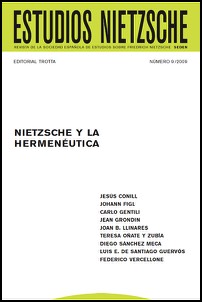Comprender el pasado estéticamente: Nietzsche y la historia
DOI:
https://doi.org/10.24310/EstudiosNIETen.vi9.10477Keywords:
objetivismo, pasado histórico, estética, interpretes excepcionalesAbstract
Partimos de la base de que, desde sus primeros escritos, se aprecia en el joven Nietzsche una especie de dialéctica que determina su discurso sobre la relación entre el presente y el pasado: se trata de la dialéctica entre la ciencia y el arte, entre el valor de los hechos interpretados objetivamente y la fuerza creadora e interpretativa del hombre, que tiene sus raíces más profundas en la vida. Desde esta perspectiva tratamos de explicar cómo la experiencia estética, en cuanto forma suprema de afirmar la existencia, pone de relieve lo que hay de afirmativo y creativo frente a una actitud indiferente o pasiva en relación al pasado
Downloads
Metrics
References
Alan D. Schrift, Alan D. Nietzsche and the question of Interpretation, between hermeneutics and deconstruction, Londres: Routledge, 1990.
Figl, Johann, Intrepretation als philosophisches Prinzip. Friedrich Nietzsche universale Theorie der Auslegung im späten Nachlass, Berlín: Walter de Gruyter, 1982.
Gadamer, H.-G., Acotaciones hermenéuticas, Madrid: Trotta, 2002,
Gadamer, H.-G., Verdad y método II, trd. de M. Olasagasti, Salamanca: Sígueme, 1992.
Grondin, Jean, Introducción a la hermenéutica filosófica, Barcelona: Herder, 1999.
Grondin, Jean, L’universalité de l’herméneutique, París : PUF, 1993.
Harmut Schröter, Harmut, Historische Theorie und geschichtliches Handeln. Zur Wissenschaftkritik Nietzsches, Mittenwald: Männder, 1982.
Hofmann, Johann N., Wahrheit, Perspektive, Interpretation. Nietzsche und die philosophische Hermeneutik. Berlín: Walter de Gruyter, 1994
Lipperheide, Christian, Nietzsches Geschichtstrategien. Die rhetorische Neuorganisation der Geschichte, Würzburg: Königshausen & Neumann, 1999.
Meyer, Katrin, Ästhetik der Historie. Friedrich Nietzsches «Von Nutzen und Nachteil der Historie für das Leben». Würzburg: Königshausen & Neumann, 1998.
Nietzsche, F., Obras Completas, I-IV (OC ). Director ed. Diego Sánchez Meca. Madrid: Tecnos, 2011-2016
Nietzsche, F., Correspondencia I-VI. (CO). Director ed. Luis E. de Santiago Guervós. Madrid : Trotta, 2005- 2012.
Nietzsche, F., Fragmentos Póstumos I-IV (FP). Director ed. Diego Sánchez Meca. Madrid: Tecnos, 2006-2010.
Santiago Guervós, Luis E. de, «Homero y la filología clásica. Arte y filosofía: los centauros del joven Nietzsche», en Anales del Seminario de Historia de la Filosofía 15 (1998), 149-167.
Siemens, Herman W., «Nietzsche sobre el genio: Schopenhauer, Wagner y el desplazamiento del Genius por el ‘espíritu libre’ en los años posteriores a 1870», en Estudios Nietzsche 7 (2007), 99-122.
Sloterdijk, Peter, El pensador en escena. El materialismo de Nietzsche, trd. esp. de Germán Cano, Valencia: Pretextos, 2000.
Spiekermann, Klaus, Naturwissenschaft als subjektlose Macht? Nietzsche Kritik phisikalischer Grundkonzepte. Berlín: Walter de Gruyter, 1992.
Vattimo, G., Mas allá del sujeto, Barcelona: Paidós, 1989.
Weisäcker, C.F., Wahrnehmung der Neuzeit, München, 1983.
Downloads
Published
How to Cite
Issue
Section
License
As of issue 21 (2021) this journal is published only in open access (diamond route).
From that number 21, like the previous numbers published in NIETZSCHE STUDIES, they are subject to the Creative Commons Acknowledgment-NoComercia-ShareIgual 4.0 license, the full text of which can be consulted at <http://creativecommons.org/licenses/by-nc-sa/4.0 >
It is the responsibility of the authors to obtain the necessary permissions of the images that are subject to copyright.
This work is licensed under a Creative Commons Attribution-NonCommercial-ShareAlike 4.0 International License.
Copyright generates two different rights: moral rights and patrimonial rights that EJFB recognizes and respects. Moral rights are those relating to the recognition of the authorship. They are rights of a personal nature that are perpetual, inalienable, unseizable and imprescriptible as consequence of the indivisible union of the author and his/her work.
Patrimonial rights are those that can be derived from the reproduction, distribution, adaptation or communication of the work, among others.







11.png)
